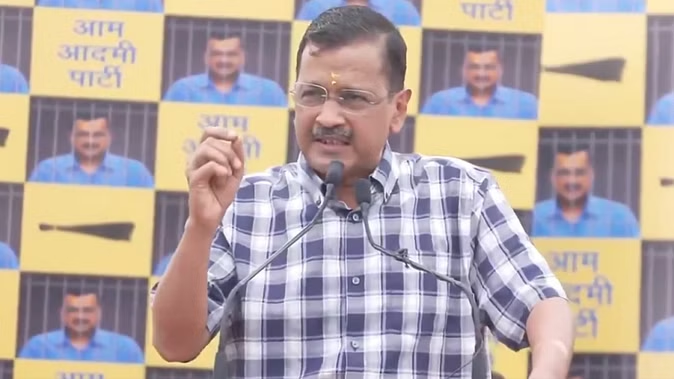Arvind Kejriwal’s Press Conference: Kejriwal asserted that Prime Minister Modi has embarked on a perilous venture, the doctrine of One Nation One Leader. The BJP has orchestrated the removal of its own stalwarts. Murli Manohar Joshi and Lal Krishna Advani have been sidelined. The political careers of Raman Singh, Shivraj Singh Chauhan, Vasundhara Raje, and Manohar Lal have been brought to an end. Now, the spotlight turns to Yogi Adityanath. In a recent ruling, the Supreme Court has granted Arvind Kejriwal interim bail until June 1st. Yesterday, Kejriwal emerged from incarceration and promptly visited the Hanuman temple. Accompanied by his wife Sunita and Punjab Chief Minister Bhagwant Mann, he offered prayers at the Hanuman temple in Connaught Place.
Subsequently, CM Kejriwal addressed the media at the AAP office, vehemently targeting the BJP. Reflecting on his recent detention, Delhi Chief Minister Arvind Kejriwal conveyed his gratitude for the warm reception upon his release after a 50-day confinement. He attributed his liberty to the benevolence of Bajrangbali. Highlighting the political repression faced by AAP leaders, Kejriwal accused the PM of employing every means to suppress dissent, even resorting to incarcerating opposition figures. He decried the influx of alleged miscreants into the BJP ranks. The impending demise of Yogi Adityanath’s political career was also forecasted by Kejriwal.
Kejriwal articulated the belief that the Prime Minister perceives the Aam Aadmi Party as a formidable adversary to the BJP’s dominance. He condemned Modi’s inception of a perilous agenda, encapsulated by the doctrine of One Nation One Leader. This initiative aims to obliterate the country’s diverse leadership, incarcerate all dissenting voices, and dismantle the political machinery of opposing parties. Kejriwal forecasted the imminent incarceration of opposition stalwarts like Mamta Banerjee, Stalin, and Uddhav Thackeray, with Tejashwi Yadav and others to follow suit. Furthermore, he alleged a conspiratorial plot to dismantle Yogi Adityanath’s political influence in Uttar Pradesh.
The annihilation of BJP leaders, including the forced retirements of Murli Manohar Joshi and Lal Krishna Advani, were cited as evidence of the ruling party’s authoritarian tendencies. Kejriwal’s impassioned plea for a concerted effort to combat corruption resonated throughout his address. He recounted his own commitment to transparency by subjecting his own party members to scrutiny. He warned against the encroachment of democracy by autocratic forces and rallied for collective action to safeguard the nation’s democratic principles. Kejriwal’s fervent appeal for popular support underscored his unwavering dedication to the nation’s welfare, transcending personal ambitions for the greater good. He chastised the BJP’s leadership, challenging their stewardship and raising questions about the succession plans within the party.
The imminent retirement of Modi himself, as per the age-related rule established in 2014, prompted Kejriwal to question the motives behind Modi’s electoral campaigns. Kejriwal evoked the resilience of the Indian populace throughout history, emphasizing the nation’s steadfast rejection of dictatorial regimes. He positioned himself as a champion against authoritarianism, beseeching the populace to rally behind him in defense of democracy. Kejriwal pledged to embark on a nationwide campaign, vowing to dedicate every ounce of his being to the cause. He scorned the opposition’s fixation on leadership, urging the BJP to clarify its prime ministerial candidate and casting doubt on their ability to deliver on their promises. With confidence in the waning fortunes of the BJP, Kejriwal predicted the emergence of a coalition government led by the India Alliance, signaling a shift in the political landscape.




